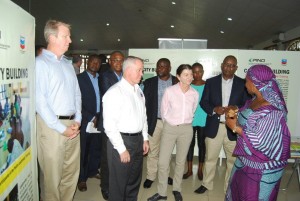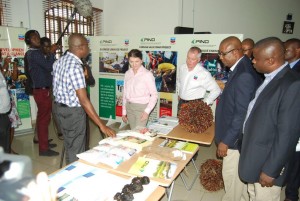How Partnerships Boost Livelihoods in the Niger Delta – Chevron Boss
“The Niger Delta will only reach its full potential when all stakeholders start working together in new collaborative ways to provide an integrated platform for building capacity for conflict resolution and long term development in the region”, so says Rhonda Zygocki, the Executive Vice President, Policy and Planning of Chevron Corporation who recently visited Nigeria with other executives of the company.
Ms. Zygocki, who was in Warri as part of her working visit, took time to assess the progress been made by the Niger Delta Partnership Initiative (NDPI) established by the company in 2010 as part of its social investment strategy and its Nigerian affiliate the Foundation for Partnership Initiatives in the Niger Delta (PIND).“Chevron is committed to instituting partnership initiatives that boost sustainable livelihood in the communities where we operate. That is why the company established the Niger Delta Partnership Initiative (NDPI)and Nigerian affiliate – the Foundation for Partnership Initiatives in the Niger Delta (PIND),” she explained.
She also noted that in 2011, the United Stated Agency for International Development (USAID/Nigeria), the Foundation for Partnership Initiatives in the Niger Delta (PIND) and the Niger Delta Partnership Initiative Foundation Inc. (NDPI Foundation Inc.) signed a Memorandum of Understanding (MoU) to make official an Integrated Peace and Development Alliance (IPDA) worth $50 million. The objective is to establish and encourage innovative multi-stakeholder partnerships that support programs and activities which empower Niger Delta communities to achieve a peaceful and enabling environment for equitable growth in the region.
With a focus on four project areas – economic development, capacity building, peace building, analysis and advocacy – PIND and its partners have successfully established an Economic Development Centre (EDC) which serves as a resource and coordination hub for the development and implementation of projects aimed at reducing poverty in the Niger Delta region by improving incomes and creating jobs. The projects include Aquaculture, palm oil and cassava value chain pilot projects which have established best practices, improved productivity and profitability in fish farming, palm oil and cassava production in the Niger Delta region.Through the support by PIND, over 60 cassava farmers from Edo state, Nigeriaqualified to supply freshly harvested cassava tubers to Thai Farms, a large cassava processor in Ogun State.
PIND has also undertaken pilot projectswith Nigeria’s National Institute for Oil Palm Research (NIFOR) to help train local engineers in creating locally-invented small-scale palm oil processing machine and in promotion of motorized adjustable harvester for harvesting palm fruits. Other successful programs undertaken by PIND and its partners include Maximizing Agricultural revenue and key enterprises in targeted states (Markets II); Appropriate Technology Enabled Development (ATED); Capacity building for Local empowerment; Youth Advocacy; Advocacy, Awareness and Civic empowerment among others.
At the PIND’s Economic Development Centre (EDC) in Warri, the Chevron Executive VP who was briefed on all the intervention programs of PIND in the Niger Delta through different presentations remarked: “We are making steady progress in breaking new grounds and delivering peaceful livelihoods to the Niger Delta communities,” The visitors also went to the United Ufuoma fish farm, Ekpan Warri, Delta State and were amazed at the huge improvement been made to the livelihoods of the local fish farmers and others in the business value chain – fish feeds suppliers, artisans, youths, etc., through technical support by PIND.
The visitors were informed that following the success of the demonstration pond pilot project implemented by PIND, over 2000 fish ponds have been established by the local farmers who confirm that they sell about seven tons of fishes daily.The pilot project saw PIND working with 80 farmers from United Ufuoma Fish Farmers’ Association (UUFFA), a large cooperative farm to help instill best practices in the lucrative and popular practice of growing catfish. According to Chief Joshua Ughere, chairman, board of trustees of the association,“The intervention by PIND exposed us to best practices in fish culturing and we have been empowered to do our business more profitably.”
In her remarks, Ms. Zygocki expressed delight at the good works that PIND is doing with the fish farmers and the cooperative. “I am delighted to see how big the fish farm is, and to hear how with the changes in the feeding practices, the fish farmers have been able to do their business more economically,” she said adding that “PIND is serving as a catalyst for bringing diverse partners together to address the root causes of the Niger Delta region’s problems. If the partners continue to work together, we can start to reverse the cycles of poverty and conflict that have plagued the region for years.”





